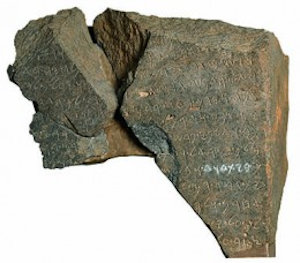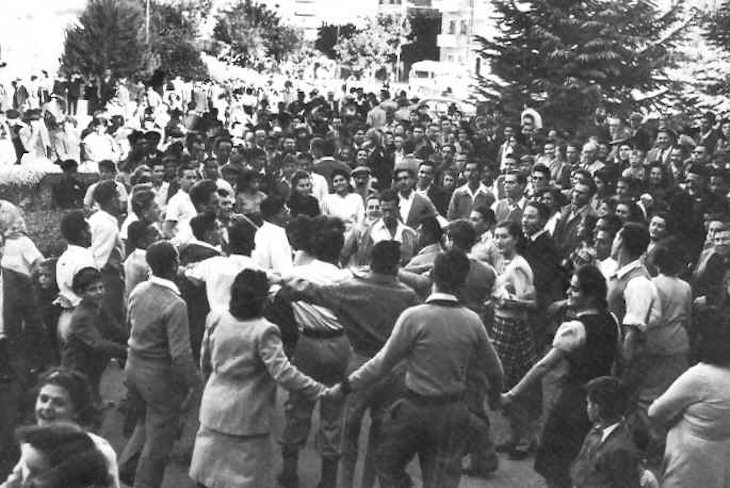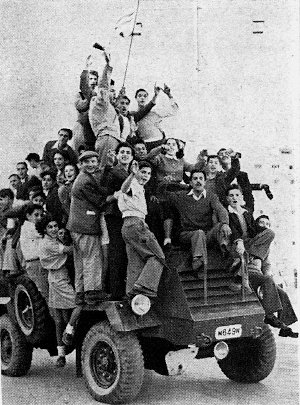 Iran’s Attack on Israel
Iran’s Attack on Israel
10 min read
Get a deeper understanding of this famous song.
It’s one of the first songs Jewish kids learn in Jewish preschool or summer camp:
Dovid, Melech Yisrael, Chai Vikayam…. David, King of Israel, Lives Forever…
For generations, Jews have sung this song about King David, yet the song carries some deeper meanings too. Here are four facts about this iconic Jewish song.
King David was born in the year 907 BCE in Bethlehem. He was the youngest of eight boys, and seemingly was overlooked by his family. When the murderous Philistine nation sought to wage war on the Jewish people, David’s older brothers went to go fight, while David stayed behind to tend his family’s animals.
One day, David’s father asked him to visit his brothers on the front lines of the war and bring them provisions. The situation that David came across was a stalemate: the Philistine army had a giant of a soldier, a huge man named Goliath who was clad in armor and towered over all the other men, and he stood on a hilltop, daring anyone to try and fight him. While the Jews debated who could best defeat Goliath, David stepped forward and volunteered. David’s older brother told him he should go back home and tend to the animals and leave the fighting to men who were more capable.
Instead, David picked up some stones and advanced on Goliath, holding his trusty slingshot. Goliath was covered with armor, but David aimed a rock directly at Goliath’s forehead, which was uncovered, and managed to knock out and then defeat the enormous man (I Samuel 17:23-54). David went on to become a decorated military hero in the war against the Philistines, and eventually married Michal, daughter of King Saul. David became king after the death of King Saul, and during his reign he secured Israel’s borders. Among his many military accomplishments was capturing Jerusalem and declaring the holy city Israel’s capital: David’s son King Solomon eventually built the Jewish Temple there.
David’s life was full of travail and struggle; one of his most enduring legacies is much of the Book of Psalms, most of which he wrote and which give expression to the timeless Jewish longing to connect with the Divine.

The fragmentary Tel Dan stela, containing the Tel Dan inscription (or “House of David” inscription) provided the first historical evidence of King David from the Bible. Photo: The Israel Museum, Jerusalem/Israel Antiquities Authority (photograph by Meidad Suchowolski).
King David is mentioned over 1,000 times in the Tanach, and is the earliest Biblical figure for whom archeologists have uncovered evidence: a stone found in northern Israel in 1993 refers to the “House of David” ruling Israel 3,000 years ago, in the 9th Century BCE.
King David reigned for 40 years; the Torah records his death and notes that he’s buried in the “City of David,” an area in central Jerusalem near the Western Wall. Yet Jewish tradition says that in a sense, King David lives eternally.
King David specified that his son Solomon should succeed him as king, yet as David lay dying, another one of his sons, Adonijah, declared himself ruler. King David’s wife Batsheva raced to tell the dying king of this development. David assured her that Solomon was his chosen heir, and Batsheva received this good news by declaring “May my lord King David live forever!” (I Kings 1:31). It wasn’t meant literally - in fact David died soon after - but Batsheva’s words reflected the reality that the timeless Jewish values King David stood for would continue through the reign of his son King Solomon, and through future kings from the House of David.
By continuing to live in King David’s legacy - by being Jewish and praying in the holy city of Jerusalem - we all are ensuring that the Jewish life King David represented continues to live on. King David is also described as the ancestor of the future Messiah: no matter how seemingly dark the situation of the Jewish people might be, we always know that the kingship of the House of David will return one day, and the trajectory of Jewish history will endure.
The words David Melech Yisrael Chai Vikayam (David, King of Israel, Lives Forever) were first declared by the great Jewish sage Rabbi Yehudah HaNasi in the 2nd Century CE. He was a member of the Sanhedrin, a court of rabbis who guided Jewish life in the land of Israel. One of the Sanhedrin’s jobs was tracking the waxing and waning of the moon in the sky. When the first new crescent moon reappeared in the sky, the Sanhedrin would call witnesses who’d seen the moon reemerge, then declare that a new Jewish month had begun.
The moon’s fluctuating brightness in the night sky reminded Rabbi Yehuda of the ever-shifting fortunes of the Jewish people. He personally witnessed the oppression and humiliation of the Jewish people in the land of Israel, persecuted by their cruel Roman overlords. Yet instead of giving into despair, Rabbi Yehuda reminded himself that just as the moon waxes and wanes, so too does the glory of the Jewish people. The kings of Israel who were descended from David might have seemed to be no more, but Rabbi Yehuda had faith that one day their glory would return. Thus, he came up with an unusual way to let people know a new moon had reappeared:
“Rabbi Yehuda Nanasi once said to Rabbi Hiyya (another member of the Sanhedrin): Go to a place called Ein Tav and sanctify the New Moon there, and send me a sign that you have sanctified it. The sign is: Dovid Melech Yisroel Chai Vikayam (Talmud Rosh Hashanah 25a).
This declaration gave the Jewish people hope: even when the glory of the House of David seems to disappear from the world, we have faith that one day his kingdom will reemerge.
David Melech Yisrael Chai Vikayam has become part of the monthly “Kiddush Levanah” (Sanctification of the New Moon) service, said by Jews around the world each month when the first crescent of the reappearing New Moon appears in the night sky.
The song David Melech Yisrael Chai Vikayam became a popular song with early Zionists whose activities rebuilding Jewish life in the Land of Israel seemed to fulfill the prophecy of the song, that one day the glory of King David’s life and legacy would begin to be rebuilt.
On November 29, 1947, the nations of the world, meeting in the United Nations, voted on whether or not to establish a modern Jewish state in the ancient land of Israel. One by one, the nations of the world cast their votes. In the end, thirteen countries voted against, ten abstained, and thirty-three voted in favor of allowing Jews to create a Jewish homeland once again. In Israel, reaction to the news was rapturous. Crowds poured into the streets, singing and dancing. One of the songs that reverberated through the land was David Melech Yisrael.

Zipporah Porath was one of the people celebrating in the streets of Jerusalem. The next day, she wrote a letter to her parents describing the scene: “Dearest Mother, Dad and Naomi, I walked in a semi-daze through the crowds of happy faces, through the deafening singing of ‘David, Melech Yisrael, chai, chai vekayam’ (David, King of Israel, lives and is alive), past the British tanks and jeeps piled high with pyramids of flag-waving, cheering children”. (Quoted in Letters from Jerusalem: 1947-1948 by Zipporah Porath, Jonathan Publications, 2005.)
Another reveler was Mordecai Chertoff, who also wrote about the crowd’s joy in a letter home to his parents in the United States. After listening to the UN tense vote on the radio, huge crowds poured into the streets.
“We heard a tremendous roar from Ben Yehuda Street (in downtown Jerusalem). ‘David Melech Yisrael chai chai vekayam’ and the roar is repeated again and again from the throats of the youth of Jerusalem banding together in a huge hora around an armored (British) police car...we ran and danced and ran and laughed and cried interchangeably without even noticing our tears. We got on a large truck with a great crowd… One young man with a trumpet walked the entire city and people followed him to the Jewish Agency...and suddenly (the crowd) started chanting ‘get a flag, get a flag…’ and suddenly the blue and white appeared on the balcony and a jubilant and fresh ‘Hatikvah’ (Israel’s national anthem) which we had never dared to hope for and never anticipated, erupted from five thousand mouths. (Quoted in Palestine Posts: An Eyewitness Account of the Birth of Israel. Based on the Letters of Mordecai S. Chertoff by Daniel Chertoff. The Toby Press, 2019.
 David Melech Yisrael Chai Vikayam has continued to bring Jews together, serving as a simple-to-sing anthem of Jewish nationhood and survival.
David Melech Yisrael Chai Vikayam has continued to bring Jews together, serving as a simple-to-sing anthem of Jewish nationhood and survival.
Yasha (Yakov) Yosifovich Kazakov was a Soviet “refusenik” (Jew who was prevented from emigrating to Israel) in the 1960s. He later was able to realize his dream and move to Israel. There, he recalled the special role that Dovid Melech Yisroel played for him and other refuseniks longing to build their homes in the Jewish state. “At nights, groups of us would gather in private homes and spend hours singing Israeli songs, new ones and old ones, from Dovid Melech Yisrael to Sharm-el-Sheikh...whenever a new song was broadcast over the Voice of Israel, we’d be singing it within a week” (quoted in Momentous Century: Personal and Eyewitness Accounts of the Rise of the Jewish Homeland and State, 1875-1978, Levi Soshuk and Azriel Louis Eisenberg, eds. Associated University Presses: 1984.
Joyce Boll, an American film producer who worked with David Letterman and Oprah Winfrey, decided to move to Israel after she visited the Jewish state as an adult. She met some family relatives in Netanya, but it was only when she paid a visit to the Dead Sea that Ms. Boll realized she wanted to live in Israel. She met some Israeli soldiers at the Dead Sea, and wanted to connect with them. “I didn’t know a word in Hebrew” Ms. Boll later recalled, “so I sang David Melech Yisrael”, the only Hebrew song she knew, which her grandmother had taught her.
The Israeli soldiers knew the simple, catchy song too, and joined in. As they sang together, Ms. Boll recalls “I thought to myself: ‘This is amazing. We are so different yet one ancient song connects us, connects the entire tribe.’ It was then that I understood where I belong.”
With its easy to remember words, its catchy tune, and its deep meaning of Jewish survival, Dovid Melech Yisrael is a way for Jews of all ages and all around the world to bond, expressing their shared history through joyous music.
